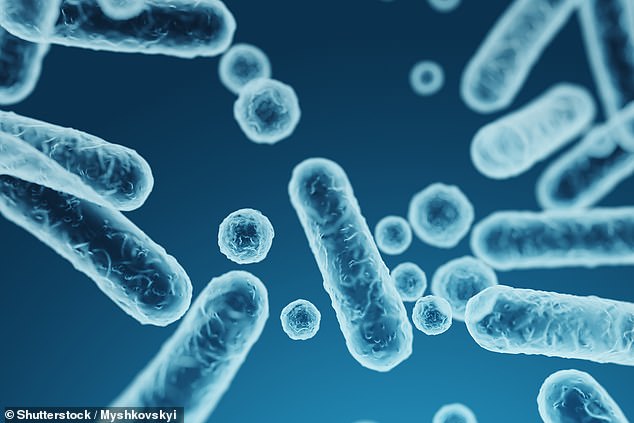The bacteria lurking in your microwave: Radiation-resistant microbes are breeding in our household appliances — including several that could be DEADLY, study warns
Whether it’s heating up a ready-made meal or reheating a cup of cold tea, many of us use the microwave several times a day.
But a new study may make you think twice before using your device.
Researchers at Darwin Bioprospecting Excellence SL, a startup based in Paterna, Spain, have discovered radiation-resistant microbes that live in microwaves.
The team said it was worrying that several strains could be fatal to humans.
“Some species found in household microwaves, such as Klebsiella, Enterococcus and Aeromonas, may pose a risk to human health,” said Daniel Torrent, one of the study’s authors.
Whether it’s heating up a ready-made meal or reheating a cold cup of tea, many of us use our microwaves multiple times a day. But a new study could make you think twice before using your appliance (stock image)
Previous studies have shown that microbes live in all sorts of weird and wonderful habitats, including marine oil spills, industrial sites, and even the International Space Station.
Until now, it was unclear which bacteria are found in microwaves.
In their study, the team collected microbes from 30 microwaves: 10 from single-household kitchens, 10 from shared spaces such as cafeterias, and 10 from science labs.
Analysis of the samples revealed 747 different types of microbes in 25 bacterial strains.
However, these strains varied considerably by location.
“Household microwaves have a more ‘anthropized’ microbiome, similar to kitchen surfaces, while laboratory microwaves harbor bacteria that are more resistant to radiation,” Torrent said.

Researchers from Darwin Bioprospecting Excellence SL, a startup based in Paterna, Spain, have discovered radiation-resistant microbes that live in microwaves. Worryingly, several strains could be deadly to humans, the team says (artist’s impression)
In the kitchens of one household, the main species of microbes were Acinetobacter, Bhargavaea, Brevibacterium, Brevundimonas, Dermacoccus, Klebsiella, Pantoea, Pseudoxanthomonas and Rhizobium.
In contrast, Arthrobacter, Enterobacter, Janibacter, Methylobacterium, Neobacillus, Nocardioides, Novosphingobium, Paenibacillus, Peribacillus, Planococcus, Rothia, Sporosarcina and Terribacillus were only found in shared household microwaves.
Of concern is that some of these microbes – Klebsiella, Enterococcus and Aeromonas – could be dangerous to humans.
Klebsiella species can cause a range of infections encountered in healthcare settings, including pneumonia, bloodstream infections, wound or surgical site infections, and meningitis.
Enterococcus can cause a range of illnesses, including urinary tract infections, bloodstream infections, and wound infections.
Finally, Aeromonas has been associated with gastrointestinal infections, kidney disease, cellulitis, and meningitis.
Based on the findings, the researchers urge people to thoroughly clean their microwaves regularly.
“We recommend disinfecting microwaves regularly with a diluted bleach solution or a commercially available disinfectant spray,” Mr. Torrent said.
‘In addition, it is important to wipe the interior with a damp cloth after each use to remove any residue. Wipe up spills immediately to prevent the growth of bacteria.’
